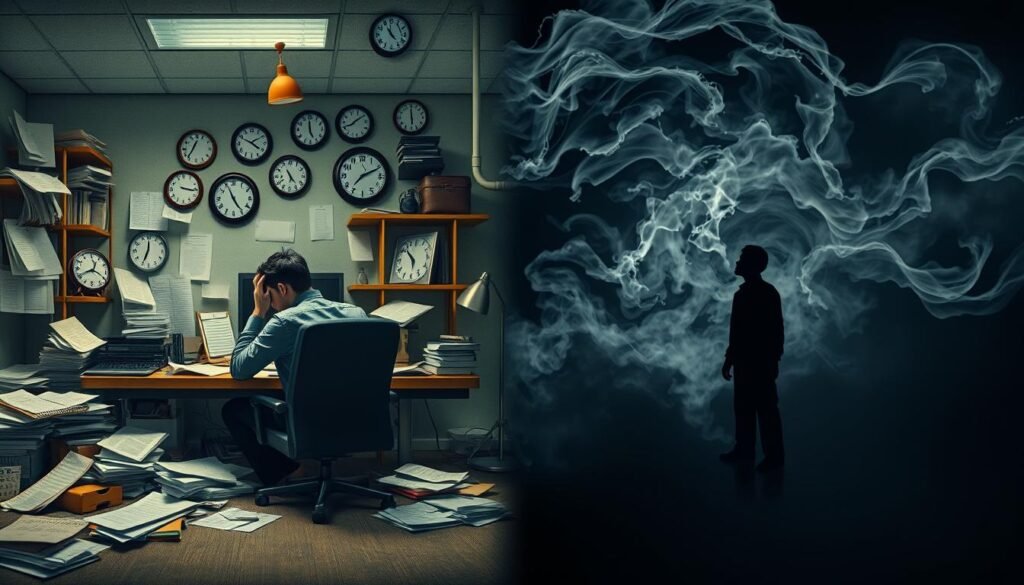Did you know about 31.1% of U.S. adults might get an anxiety disorder sometime? This shows how common anxiety disorders are today. It also raises a key question: are stress and anxiety the same? While both affect our lives daily, knowing the differences between stress and anxiety is key.
Stress is usually a response to something outside ourselves. Anxiety, however, sticks around even when those outside pressures are gone. By understanding how stress differs from anxiety, people can handle their feelings better. They can also find the right help. Readers will learn about these conditions, what causes them, and how to cope as they read on. For more info, check out University Health.
Key Takeaways
- Stress and anxiety, while related, are distinct experiences.
- Understanding their differences aids in effective management and coping strategies.
- Chronic stress can increase the risk of anxiety disorders.
- Prolonged anxiety often requires professional assistance for treatment.
- Building a support system is vital for coping with both stress and anxiety.
Understanding Stress and Anxiety
Stress and anxiety seem similar but are quite different. Knowing what they are is key to figuring them out in life. Stress comes from outside stuff, like work or fights. Anxiety is more inside, with worrying even when all seems okay.
Definitions of Stress
Stress pops up when something outside bugs us, like deadlines or arguments. It can make you feel mad or worn out. Once the problem goes away, so does the stress.
Definitions of Anxiety
Anxiety is when you worry a lot, even without a clear reason. It shares some stress symptoms but sticks around longer. Knowing how stress and anxiety differ is vital. Without help, anxiety can get worse and turn into a disorder.
Causes of Stress and Anxiety
It’s key to grasp what brings about stress and anxiety for handling them well. Stress usually pops up when we face external challenges. Anxiety, on the other hand, comes from a deeper place within us. This shows how complex our feelings are and why we need specially crafted ways to cope.
External Triggers of Stress
Stress mainly comes from the outside stuff we deal with. You might feel stressed from:
- Workplace challenges, such as tight deadlines or demanding projects.
- Difficulties in personal relationships, including conflicts with loved ones.
- Financial pressures, leading to increased strain on day-to-day living.
Such external stress triggers make us either want to face the issue or escape it. Signs like feeling tight, worrying lots, and headaches often show stress is affecting us.
Internal Origins of Anxiety
Anxiety usually starts inside rather than from things we can point at. People often deal with:
- Pervasive fears and concerns that appear without clear triggers.
- Conditions like generalized anxiety disorder, which provoke ongoing feelings of apprehension.
- Internal dialog that fosters negative self-perception or anticipatory dread.
These inner sources of anxiety can stick around and mess with how someone functions daily. The toll of unchecked anxiety can include health problems across various systems, like the immune and cardiovascular. It’s crucial to understand these origins to manage anxiety well.
https://www.youtube.com/watch?v=a-n2ZcgjLso&pp=ygUQI3N0cmVzc2FuZGF4aWV0eQ%3D%3D
| Aspect | Stress | Anxiety |
|---|---|---|
| Trigger | External (work, relationships) | Internal (fears, phobias) |
| Symptoms | Worry, tension, headaches | Pervasive apprehension, panic attacks |
| Impact | Can be positive or negative | Often debilitating |
| Management | Coping techniques, support | Counseling, medication |
Symptoms of Stress vs Anxiety
Understanding stress and anxiety symptoms is key. Both affect people in varied ways. Looking closely at physical, mental, and emotional impacts shows how they are connected.
Common Physical Symptoms
Stress and anxiety can lead to uncomfortable physical symptoms. Common physical symptoms include:
- Increased heart rate
- Excessive sweating
- Gastrointestinal issues
- Trembling or shaking
- Muscle tension
- Dizziness
Stress often causes short-term physical reactions. However, anxiety symptoms can last longer and be more severe. Recognizing these signs is vital for getting help. Check out this useful resource for more details.
Mental and Emotional Symptoms
The way stress and anxiety affect your mind and emotions is tough. Common symptoms include:
- Irritability
- Difficulty concentrating
- Feeling overwhelmed
- Constant worry from anxiety
Anxiety can make you feel scared without clear reasons. Stress might start from outside pressures and become a long-term problem if ignored. Knowing these symptoms helps people manage them better.
Is Stress and Anxiety the Same Thing?
Is stress the same as anxiety? It’s a bit complex. While they share symptoms and triggers, there are key distinctions between stress and anxiety. Stress is our reaction to pressure from the outside. Anxiety, however, lingers even after the stressors are gone. Knowing the difference between the two is important.
Key Distinctions Between Stress and Anxiety
Stress pops up when we face an immediate threat. It’s usually short-lived and linked to a specific event. On the other hand, anxiety is a deeper, more constant state. It involves ongoing worry and being on high alert. Over time, too much stress can turn into an anxiety disorder. This shows a clear road from stress to anxiety. Unlike stress, dealing with anxiety often means seeking out more involved treatments.
Comparative Analysis of Both Conditions
When comparing stress and anxiety, it’s clear they are similar but also very different. Both can make us feel cranky, upset our stomachs, and tire us out. Yet, it’s how long they last, what causes them, and how deeply we feel them that sets them apart. Knowing these differences helps us find the right ways to cope and get better.
| Category | Stress | Anxiety |
|---|---|---|
| Duration | Usually short-term | Can be chronic or long-term |
| Triggers | External events (e.g., deadlines, exams) | Internal worries or excessive fears |
| Physical Symptoms | Increased heart rate, sweating | Similar symptoms plus chronic fatigue and panic attacks |
| Emotional Impact | Immediate discomfort | Persistent feelings of dread or apprehension |
| Treatment Approaches | Temporary strategies, lifestyle changes | Medication, therapy, long-term management |

Managing Stress and Anxiety
It’s crucial to handle stress and anxiety well for good mental health. Many people face stress and anxiety, impacting daily activities. Learning effective ways to deal with these issues is important.
Coping Strategies for Stress
To cope with stress, try physical activity, breath control, and fun activities. Facing stressors head-on can also help. Small changes in your day-to-day life can make you stronger against stress.
- Physical Activities: Exercise helps relieve stress.
- Breathing Techniques: Deep breaths calm your mind.
- Leisure Activities: Hobbies offer a great escape.
Coping Strategies for Anxiety
There are many ways to tackle anxiety. Using cognitive behavioral therapy, mindfulness, and sometimes medicine helps a lot. Knowing your triggers and reducing caffeine intake can also aid in lessening anxiety feelings.
- Cognitive Behavioral Therapy (CBT): This is a way to shift negative thinking.
- Mindfulness: Being in the moment helps with awareness.
- Medication: A doctor can advise if drugs might help.
For advice and support, visiting mental health organizations online is a good step. Remember, asking for help is important when dealing with stress and anxiety.
| Coping Strategies for Stress | Coping Strategies for Anxiety |
|---|---|
| Physical Activities | Cognitive Behavioral Therapy |
| Breathing Techniques | Mindfulness Practices |
| Leisure Activities | Medication Consultation |
Effects of Chronic Stress and Anxiety
Chronic stress and anxiety greatly affect a person’s well-being. Understanding how they impact life is key to managing them. This knowledge can lead to better health choices.
How Stress Affects Daily Life
Stress and anxiety change how we handle daily life. People may do worse at jobs and have trouble in relationships. They might also face health problems.
Stress causes a cycle of negative reactions. For example, stressful events can make someone irritable or tired. This can hurt relationships or work. Also, stress can cause serious health issues like heart problems, digestive issues, and sleep troubles.
Long-term Consequences of Unmanaged Anxiety
Unmanaged anxiety can worsen over time, leading to severe health problems. People with a tough past or childhood traumas are more at risk. They may experience more anxiety.
This anxiety can cause more than just emotional pain; it can bring on depression and obesity. Finding help through counseling or lifestyle changes is essential. It can increase happiness and life fulfillment.

Stress and Anxiety Disorders
Understanding stress and anxiety disorders is key to knowing how they impact mental health. We will look at common anxiety disorders. Let’s also see how stress and anxiety are connected.
Overview of Common Anxiety Disorders
Anxiety disorders include many conditions with intense anxiety. Here are the most common types:
- Generalized Anxiety Disorder (GAD): This involves a lot of worry for more than six months.
- Panic Disorder: It causes sudden anxiety attacks. These can lead to sweating, dizziness, and breathing problems.
- Social Anxiety Disorder: This means a sharp fear of social situations and feeling very self-conscious.
The National Institute of Mental Health states 31% of Americans will face an anxiety disorder. Knowing about them is very important.
The Relationship Between Stress and Anxiety Disorders
Stress and anxiety disorders are closely linked. Stress can trigger anxiety symptoms. For those prone to anxiety, stress can make it worse. Understanding this helps in treating both.
Stress and anxiety can cause a rapid heartbeat, digestive problems, and sleep trouble. Stress comes from certain triggers, but anxiety might not have a clear cause. Long-term stress can turn into chronic anxiety. This makes it harder to diagnose and treat.
Treatment Options for Anxiety and Stress
Many options exist for treating stress and anxiety. They mainly focus on therapy and medicines. Knowing about these can help you choose the best for your mental health.
Therapeutic Approaches
Cognitive Behavioral Therapy (CBT) is a top choice for tackling anxiety disorders. It helps people identify and change negative thoughts. CBT is very effective for panic attacks, social anxiety, and general anxiety disorder. Other key therapies include:
- Exposure Therapy: This approach gradually introduces feared situations to lessen anxiety over time.
- Systematic Desensitization: It starts with less scary things, helping people face their fears gradually.
- Thought Challenging: Part of CBT, this method helps replace negative thoughts with positive ones.
Studies show therapy often brings major improvements in 8 to 10 sessions. This highlights why professional help is crucial. Online therapy is also an effective alternative, matching the success of face-to-face sessions.
Medication and Professional Help
Psychotherapy and medications are the primary treatments for anxiety disorders. Doctors may prescribe antidepressants, benzodiazepines, and beta-blockers to ease anxiety symptoms. Psychiatrists are essential in diagnosing and treating these conditions, using the DSM-5 as a guide.
While medicines can reduce symptoms, they work best alongside therapy. Adopting a healthy lifestyle, like good eating, exercise, and sleep, also helps manage anxiety. More research is needed to prove the effectiveness of herbal solutions for anxiety.

Coping with Stress and Anxiety Together
Finding ways to combat stress and anxiety can make life better. Learning how to handle both can make us emotionally stronger. Using relaxation methods and having people to lean on helps a lot.
Integrating Relaxation Techniques
Adding simple activities to your daily routine helps with stress and anxiety. Things like yoga, meditation, and deep breathing are really helpful. They calm your mind and body, easing tension and grumpiness, and make you feel better overall.
Building a Support System
It’s important to have people around who support you. Talking with friends, family, or experts helps you express yourself. This network helps fight stress by giving you courage and new ideas, making you feel you belong.
| Relaxation Techniques | Benefits |
|---|---|
| Yoga | Makes you more flexible, less tense, and more relaxed. |
| Meditation | Helps you focus, lowers your anxiety, and brings peace. |
| Breathing Exercises | Slows your heartbeat, stops panic, and improves breathing. |
| Talking to a Friend | Gives you emotional support, strengthens bonds, and fights loneliness. |
By doing these things, you can better handle stress and anxiety. It leads to a healthier and more balanced life.
Conclusion
It’s key to know how stress and anxiety differ for better management and mental health. Stress usually comes from outside pressures like work or relationships. Anxiety, however, involves more constant worry without a specific reason.
Both stress and anxiety can impact your daily life negatively. When stress is ongoing or anxiety becomes too intense, it causes problems. Signs to watch for include headaches, a fast heartbeat, or trouble sleeping. If these issues persist, getting professional advice is important, particularly if they disrupt your life or cause a lot of worry.
Trying things like deep breathing, staying active, and having a good support circle helps in dealing with stress and anxiety. Making mental health a priority by understanding stress and anxiety is a step towards being resilient. By using coping skills and leaning on friends and family, dealing with challenges gets easier. For deeper understanding, check out the resources at understanding the difference between stress and anxiety.